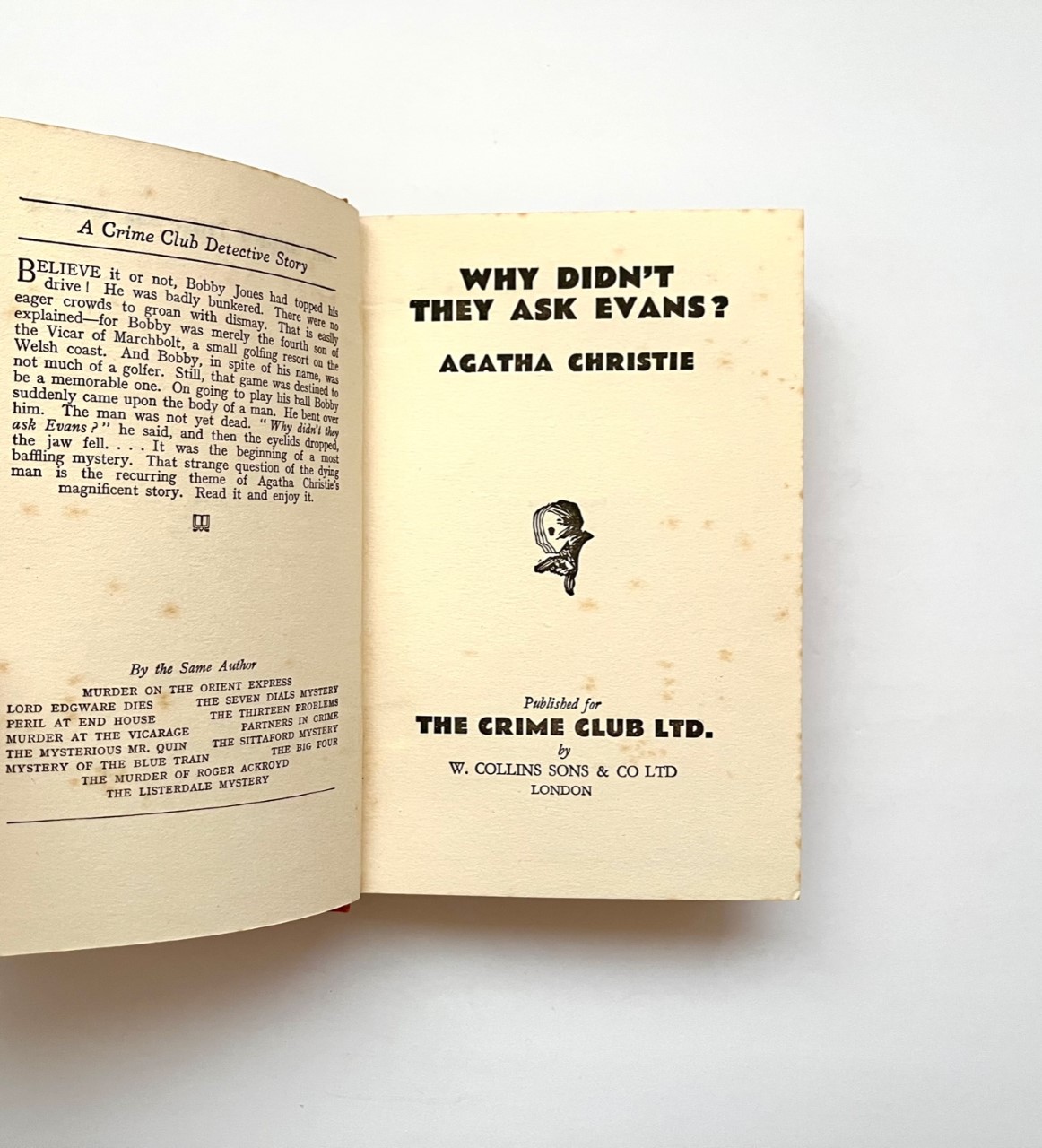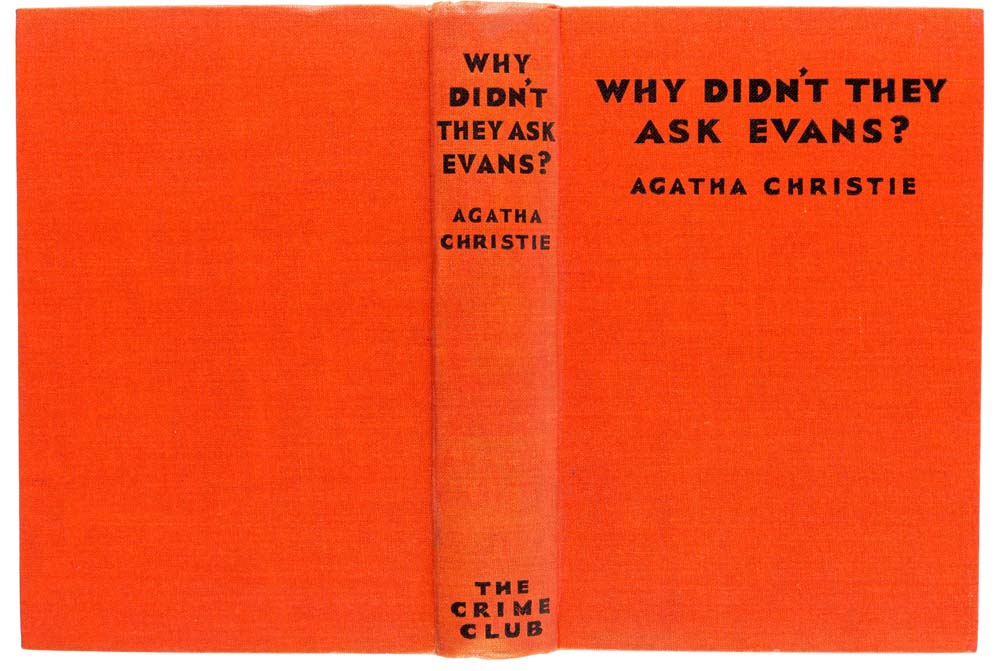The Unasked Query: Why Did not They Ask Evans? An Exploration of Agatha Christie’s Narrative Technique
Associated Articles: The Unasked Query: Why Did not They Ask Evans? An Exploration of Agatha Christie’s Narrative Technique
Introduction
With enthusiasm, let’s navigate by the intriguing subject associated to The Unasked Query: Why Did not They Ask Evans? An Exploration of Agatha Christie’s Narrative Technique. Let’s weave fascinating info and provide recent views to the readers.
Desk of Content material
The Unasked Query: Why Did not They Ask Evans? An Exploration of Agatha Christie’s Narrative Technique

Agatha Christie’s Why Did not They Ask Evans? stands as a testomony to her mastery of plotting and character improvement. But, even inside the framework of a meticulously crafted thriller, a central query persists: why the title? Why did not anybody, initially, ask the seemingly insignificant query that unlocks all the case? This obvious oversight is not a flaw, however reasonably a deliberate narrative selection that highlights a number of essential facets of Christie’s storytelling prowess: the misleading nature of appearances, the facility of seemingly trivial particulars, and the restrictions of human notion within the face of fastidiously constructed deception.
The novel’s central thriller revolves round a dying man’s cryptic utterance, "Why did not they ask Evans?" This seemingly easy query, whispered by a dying man who has been struck on the pinnacle, is the catalyst for all the investigation undertaken by Bobby Jones and his cousin, Frankie Derwent. The query itself is initially baffling; its that means is obscured by the shortage of context and the sufferer’s precarious state. This deliberate ambiguity instantly attracts the reader into the narrative, mirroring the confusion and frustration skilled by Bobby and Frankie as they try and decipher its that means.
The reply, when it lastly emerges, isn’t a single, simply digestible revelation however reasonably a posh net of interconnected occasions and thoroughly hid identities. The "they" within the query aren’t a particular group of people however reasonably a illustration of the collective investigative course of, a system liable to overlooking essential particulars when blinded by preconceived notions and superficial proof. The preliminary failure to ask the query is a mirrored image of the investigative shortcomings of each the police and the novice sleuths who initially encounter the case.
A number of elements contribute to this preliminary failure. Firstly, the superficial nature of the crime scene misleads the investigators. The main target initially rests on the obvious unintentional nature of the sufferer’s dying. The harm, a blow to the pinnacle, is definitely attributed to a fall or different mishap. The seemingly random nature of the sufferer’s dying, coupled with the shortage of apparent motive, prevents the authorities from pursuing a extra thorough investigation. The query itself is deemed irrelevant, a dying man’s rambling, reasonably than a significant clue.
Secondly, the characters concerned are hampered by their very own biases and preconceived notions. The police, accustomed to coping with easy circumstances, fail to acknowledge the importance of the seemingly insignificant element. They’re blinded by their very own assumptions and fail to attach the dots. Equally, Bobby and Frankie, whereas initially extra perceptive, are initially sidetracked by pink herrings and deceptive clues, solely step by step realizing the significance of the query because the investigation progresses.
The narrative subtly highlights the hazards of superficial judgment. The seemingly unimportant particulars, just like the {photograph} discovered on the sufferer, are initially dismissed. This {photograph}, that includes a younger girl, is essential to fixing the case, but its significance is barely step by step revealed as Bobby and Frankie delve deeper into the thriller. The preliminary failure to attach the {photograph} to the dying man’s query underscores the significance of meticulous commentary and the hazards of counting on assumptions.
Moreover, the novel exposes the restrictions of human notion. The killer, Henry, is a grasp manipulator, fastidiously setting up a situation designed to deflect suspicion. His actions are delicate, his motives fastidiously hid. The preliminary failure to ask Evans is a direct results of Henry’s crafty and his capacity to control the circumstances surrounding the crime. The killer’s success in concealing his id underscores the significance of questioning all the things, even the seemingly apparent.
Christie masterfully makes use of the title to create a way of irony and suspense. The reader, aware of the unfolding investigation, shares the frustration of Bobby and Frankie as they grapple with the that means of the query. This shared expertise strengthens the reader’s connection to the narrative and heightens the sense of anticipation because the thriller slowly unravels. The repeated point out of the query all through the novel serves as a continuing reminder of the ignored element, a delicate but persistent nudge in direction of the reality.
The title, subsequently, isn’t merely a descriptive label however a thematic factor that encapsulates the central message of the novel. It highlights the significance of thorough investigation, the hazards of superficial judgment, and the restrictions of human notion within the face of fastidiously constructed deception. The failure to ask Evans isn’t an accident however a deliberate narrative system employed by Christie to underscore the intricacies of her plot and the subtleties of her characters.
In conclusion, the query "Why did not they ask Evans?" isn’t a easy question with a simple reply. It is a multifaceted enigma that displays the complexity of human nature, the restrictions of investigative processes, and the misleading energy of fastidiously constructed narratives. Christie’s genius lies in her capacity to create a thriller that’s each intellectually stimulating and emotionally participating, leaving the reader not solely with the satisfaction of fixing the puzzle but additionally with a deeper understanding of the delicate methods wherein fact could be obscured and the way even the smallest element can maintain the important thing to unlocking probably the most complicated mysteries. The unanswered query, initially, turns into the very engine driving the narrative ahead, a testomony to Christie’s masterful storytelling and her profound understanding of human psychology.








Closure
Thus, we hope this text has supplied precious insights into The Unasked Query: Why Did not They Ask Evans? An Exploration of Agatha Christie’s Narrative Technique. We thanks for taking the time to learn this text. See you in our subsequent article!